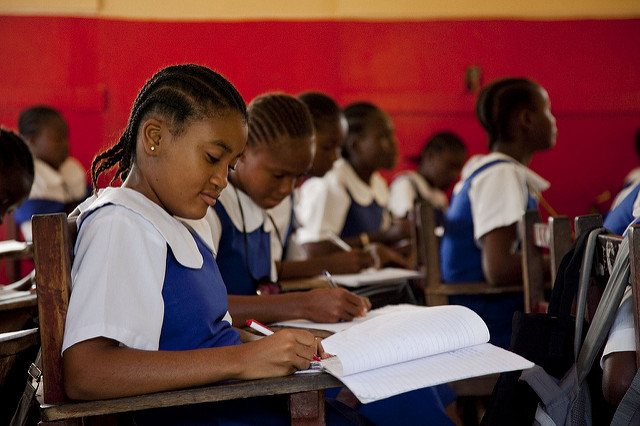In a September 20 op-ed written by Martin Kollie on the state of the education system and Education Minister George Werner’s role at the helm of the ministry, there were several misleading claims made by the columnist.
The crux of Kollie’s argument is that Werner is poorly equipped for the job of minister of education and that he has not accomplished most of his stated aims in the 16 months he has held the office. To ensure our readers discern between fact and fiction, we have excerpted contentious portions of Kollie’s op-ed and included unbiased analyses.
“Upon his preferment, there was broad skepticism from trained educators about his ability to transform Liberia’s messy educational sector. This skepticism grew even more due to his low credentials, particularly in education. Besides other credentials, Werner holds only one Bachelor of Arts degree in general education and religious studies from Marist College in Nairobi, Kenya.â€
While Kollie is correct that Werner holds a Bachelor of Arts degree from Marist College, he fails to mention Werner’s Master degree in Social Work from the University of Pennsylvania. According to the Ministry of Education’s website, Werner has also studied at St. Joseph University in Philadelphia, USA, and at the University of South Africa. Moreover, the ministry’s website notes that Werner has taught high schools in Liberia, Kenya, Nigeria, South Africa, and the United States. He also taught at the Mother Patern College of Health Sciences. Kollie’s statement suggests that Werner has had little to no prior experience in the education field, which is misleading.
“The most horrible WAEC result since 2013 came under Werner’s reign. 22,671 out of 46,927 students failed WAEC this year (48.46 percent failure). WAEC could not even be held as planned (May 2016). There was also a mass failure in high schools across Liberia mostly due to the poor quality of education.â€
Kollie suggests that the mass failure in this year’s exams is Werner’s doing because the failure came under Werner’s reign. To drive his point, Kollie only compared against the last three exam sittings (inclusive of this year’s). However, even comparing the 2013, 2014, and 2016 tests, more candidates failed in 2014 than this year, although the number of candidates passing was lower due to an unusually high number of results being withheld for potential collusion or ‘irregularities.’
Moreover, the 2016 tests were quite unusual in that students from the truncated school year due to Ebola the prior year were also taking the test as the exams were not administered in 2015. It has been demonstrated that those students performed worse than the general population.
The Liberia Institute for the Promotion of Academic Excellence, an organization that is working to increase student achievement gains on WAEC exams, conducted its WAEC in Review project to prepare 1,690 students at several schools for the tests.
The organization said while 74 percent of its students passed the exams, of the 439 who failed, 71 percent were from the truncated school year.
It is also important to note that the WAEC high school exams test students on cumulative topics learned over their time in senior high school and prior. It may not be fair to judge based on 16 months in office, especially when for several of those months, students were not in school.
“Is the ministry on the path to getting the biometric ID card to monitor the attendance of teachers? Has the ministry cleaned its payroll from ghost names as promised…? To what extent have unqualified teachers been booted out of the classrooms? Is Werner really meeting up with public expectation in accordance with his purported policy? I am asking all of these questions because these were overly ambitious promises made by Werner. The ‘successes’ of his ‘master-plan’ after 16 months are vague and hard to detect.
Kollie lists several questions to drive the point that Werner’s ‘successes’ are “vague and hard to detect.†However, the Bush Chicken has reported on some of the accomplishments of the ministry, including its elimination of over 1,000 ghost teachers from the payroll. Additionally, the ministry has completed testing teachers in Montserrado, Bong, and Nimba to ensure that teachers were properly equipped to teach.
“Privatizing or commercializing public primary education to a profit-making entity like Bridge International Academies, speaks to the fact that the government has neglected its moral obligation and constitutional responsibility, which is in blatant violation of children’s right to free and compulsory education.â€
To be precise, what the ministry is doing is not called privatizing. It’s done in other countries, such as the United States, where such schools are referred to as charter schools and are seen as distinct from private schools. The ministry is contracting out the management of its schools, but some functions will remain in government territory. The teachers used are all government-paid, and the operators are bound by the Civil Service Agency’s rules.
“Why is our government paying Bridge International Academies a whopping US$11.4 million to run a pilot of 70 schools in a period of one year when there are thousands of schools in ruin? What sense does it make for our government to give BIA an estimated US$65 million in 5 years in order to privatize public primary education? Why couldn’t the government divert this US$11.4 million to build high-tech libraries, science laboratories, reading rooms, computer labs and teacher lounges across public schools?â€
This issue has been covered in an in-depth interview conducted by The Bush Chicken with Werner. The government is in fact not providing any money to the private operators; rather, that money will come from donors. Because this is donors’ money that is restricted to this project, the ministry cannot “divert†it for other uses.
Additionally, Kollie is using outdated information in his statements. Bridge International Academies is only one of the eight different operators running the 94 schools, and Bridge will only operate 24 institutions.
“Instead of spending US$65 million in 5 years to cater for just a few schools, it is more logical for the government to train more teachers, build more primary schools, strengthen the system of monitoring and evaluation, employ more qualified teachers and school administrators, construct regional teacher colleges, etc.â€
While Kollie’s assertion makes sense, once again, this is not money that the government has to spend. It is often the complaint of officials within the ministry that when payroll is accounted for, the ministry is left with only US$7 million to spend on other education items.
Featured photo by Laura Elizabeth Pohl




